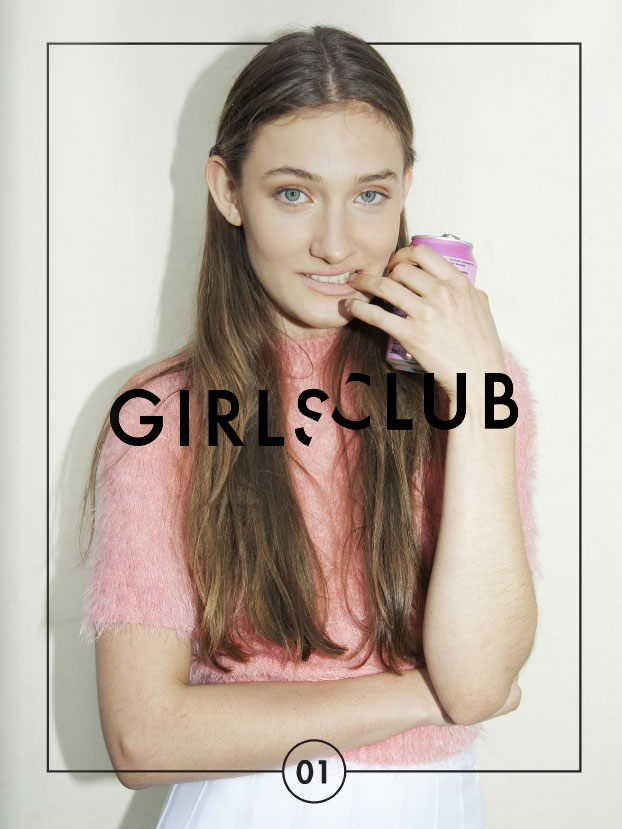On Wednesday evening, researchers, students and academics came together to discuss feminism and fashion, from the early 20th century wave through to the Internet age. Chaired by Djurdja Bartlett, LCF researcher and Coordinator of Fashion, Media and Research Hub, the round table debate played host to Ilya Parkins, Visiting Fellow at Gender Institute, London School of Economics, Georgia Murray, MA Fashion Journalism graduate and founder of GIRLS/CLUB zine and Pamela Church-Gibson, Reader in Cultural and Historical Studies.

Front cover of MA Fashion Journalism graduate Georgia Murray’s magazine GIRLS/CLUB
The panel began by discussing the notion of the four waves of feminism including lipstick feminism in the 90s and seventies activism.
Ilya Parkins commented “I am a bit suspicious of the theory of waves. They tend to obscure what happens in between them, which is a lot actually. Waves are just moments of visibility; I think this is where fashion comes in, as it is always about visibility, spectacular visibility. So its interesting how these two forms hang on to each other.” She added “We can map moments of great fashion change to moments of eruption in feminism.”
Djurdja responded “I agree about the waves, they’re a pragmatic tool but they only cover fragments.” Ilya concluded “The problem with waves is it boils things down; and its way more complicated that that.”
The panel then discussed feminist academia and theory more generally, both its pitfalls and shifting identity. Pamela Church-Gibson said “My essay in Fashion Cultures in 2001 was very much an intervention in academic debate. I am increasingly concerned that feminism has very much become an academic project.” On feminism’s disconnect from everyday life Church-Gibson added “There is a strong strand of feminists at the moment in the States, of older women trying to protect younger women from wandering around scantily clad; and then young women saying I can wear what I want. I think the feminist project is in terrible peril at the moment. There is a lot of antipathy. We need to think of feminism as something practical; we need to get back to where we started”
The distinction between fashion and dress was raised. Georgia Murray commented “The Chanel catwalk episode didn’t cause as much of a debate as Kim Kardashian naked on he front cover of a magazine. Its dress and the body, more than fashion’ that impacts young women’s sense of identity.”
The discussion then turned to notions of femininity and how this is defined. The first issue of GIRLS/CLUB zine, published as Georgia’s final project for her MA, is notably pink in tone and depicts a bubblegum image of a longhaired girl in a fluffy top. This was intentional, said Murray “I don’t think it’s a new thing to say you can be a feminist and shave your legs. Femininity was previously a word associated with passivity. That’s not how me and my friends see it.” This fuelled conversation about Sarah Lucas’ work for this year’s Venice Biennale and her subsequent interview for the Guardian where she said “Yes, I am a feminist, and it is a feminine show”. The work, “absolutely for women” featured plaster casts of her close group of female friends, draped over household objects, and put the debate in an art context.
This notion of solidarity between women, and women taking their friends as their subject matter, came up when the panel considered the Internet age and celebrity.
Georgia, who is about to publish issue two of GIRLS/CLUB said the internet “Has become a hugely powerful tool. The younger generations can communicate far better than we ever could. We didn’t have this tool in the past, to get together and create this amazing thing, with connections with other women all over the world.” She used Taylor Swift as an example of a celebrity who “is using their power, but not using her body particularly. And she’s embraced solidarity in women through her close group of friends and peers.”
The Internet debate was divided, however, with Pamela Church Gibson adding “It is also a platform to become messy.” And the conversation turned to trolling and the negative impact of selfies on young women’s self esteem.
But positive steps forward have been made, highlighted Ilya Parkins:
“I see so much energy around the term feminism right now, through figures like Beyonce. I think some of the earlier activism has trickled down, even into the school curriculum.”

